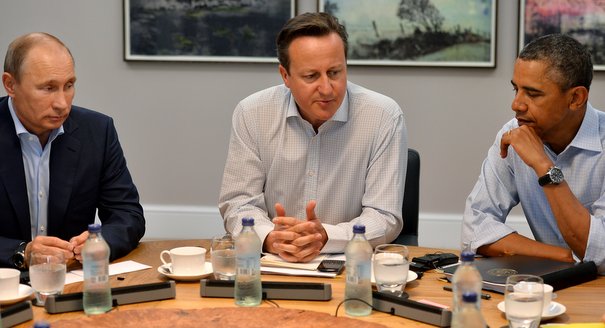I am not going to analyze either the agenda of the current G8 Summit or its outcomes. There will be folks ready and eager to do this. I may only ask the question: Who remembers the agendas of the previous Summits and whether these agendas were realized?! These Summits present opportunities for collective and bilateral meetings; the latter of which is particularly important. Yet given that group discussion tends to be unsuccessful, why make such an effort to collectively schmooze? Especially when the Kremlin obstructs all ideas on the part of the Euro-Atlantic community? Is this a demonstration of Western masochism? Apparently, yes, if one looks at the expected Putin’s rejection of the Western stance on Syria.
May be one could expect consensus on some other issues? But what??
The current G8 Summit begs the question: what does the political format of the G8 say about Russia’s relations with the West? I would remind everyone that Russia became a full-fledged member of the Western club of developed liberal democracies in 1997 at the Summit in Denver. In their joint statement, the leaders of the Western democracies stated that Russia “concludes the historic transformation to the democratic state with market economy.” Membership was intended both to mark Yeltsin’s achievements and to inspire the Kremlin to move further on the path of the liberal transformation.
Since then, Putin’s Russia has been steadily moving—but in the opposite direction, strengthening a new authoritarian state with growing political control over its economy. Today even the most determined optimists would find it difficult to suggest that Russia is a democratic entity. The Putin regime’s development into a police state, relying on repression and anti-Western propaganda, has become too apparent. Why then do G8 Summits continue, and why does the West continue to pretend that Putin is a credible participant?
I would argue that G8 Summits reflect two things: firstly, the ungrounded hopes of the 1990s, and the lack of understanding at that time where Russia was heading; and secondly, the inability of the West to find an alternative forum to interact with Russia—one that is not dependent on the idea of a Russian democracy.
One could argue that the Western leaders are pragmatists and do not want to increase tension in their relations with the Kremlin by disbanding the G8 forum. But at the same time, its continuation only legitimizes Putin’s regime and undermines credibility and adherence to normative dimension of the West.
Regarding the practical results of the Summits: I would be glad to see any of them, if someone can remind me of any.
Oh, if you remind me about Cameron’s optimism regarding the outcomes of the Summit, I suggest you look at Martin Rowson’s cartoon. And several others that adequately reflect the substance of G8 meetings.
